|
|
|
Sort Order |
|
|
|
Items / Page
|
|
|
|
|
|
|
| Srl | Item |
| 1 |
ID:
072006
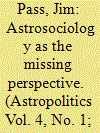

|
|
|
|
|
| Publication |
2006.
|
| Summary/Abstract |
Astrosociology represents a distinctive emergent field within the sociological discipline and outside of it, inclusive of the other social sciences and a strong connection to the natural sciences. It provides a heretofore absent focus that partly serves to complement the work of space scientists and engineers, including the space policy issues that guide the direction of their work. By adopting astrosociology, this missing perspective increases the current scope of attention by adding its focus on the societal implications of human developments related to space generally and space exploration specifically. This relationship between space and society, viewed in both causal directions, influences social change within any particular society and possesses implications for future projects and missions. Astrosociology adds a sociocultural dimension to the conventional approach of space sciences that currently devalues a social science orientation. With the addition of astrosociology, practitioners of space will become exposed to decision-making criteria normally unavailable to them under current circumstances.
|
|
|
|
|
|
|
|
|
|
|
|
|
|
|
|
| 2 |
ID:
103927
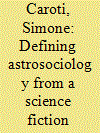

|
|
|
| 3 |
ID:
103925
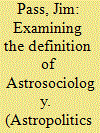

|
|
|
|
|
| Publication |
2011.
|
| Summary/Abstract |
A void has existed within the social sciences for over fifty years since the launch of the first Sputnik satellite in October 1957. This void delineates the boundaries of a missing field, a discipline capable of focusing on the relationship between social life and outer space. It is true that social scientists have pursued space issues over the last thirty years or so. As individuals, they have participated in the areas of search for extraterrestrial intelligence research, astrobiology, space policy, and space history. The strength of astrosociology, however, lies in its formalization of this type of approach into an identifiable field of study, which allows for a more organized and inclusive opportunity for participation. As a starting point, one may express the relationship between social life and outer space as astrosociology. One can define astrosociology as the study of social, cultural, and behavioral patterns related to outer space. The purpose of this article is to provide a general framework for more precise language concerning the definition, scope, character, and future development of astrosociology, while simultaneously attempting to elicit a broader discussion of astrosociology's association to other disciplines. It suggests how the various fields and disciplines associated with astrosociology as a multidisciplinary field can work together to build a missing body of knowledge from their related literatures and contemporary research.
|
|
|
|
|
|
|
|
|
|
|
|
|
|
|
|
| 4 |
ID:
103926
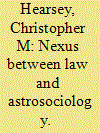

|
|
|
| 5 |
ID:
103929
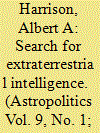

|
|
|
|
|
| Publication |
2011.
|
| Summary/Abstract |
The search for extraterrestrial intelligence (SETI) is a human activity with profound implications for society and culture that fall within the purview of astrosociology. In this article, we review some of the astrosociological aspects of SETI and identify ways to seek evidence-based, rather than purely speculative, answers. Recurrent issues include the organization and conduct of the search; human-alien comprehension and communication; human reactions to the discovery of extraterrestrial life; and the comparative analysis of possible extraterrestrial civilizations. Over the past 50 years, a small but growing number of anthropologists, artists, historians, philosophers, political scientists, psychologists, sociologists, and theologians have applied their expertise to SETI and its possible consequences. The current challenge for astrosociology is not gaining entree to SETI; rather, it is one of increasing the interest of more social and behavioral scientists in the search and its potential effects.
|
|
|
|
|
|
|
|
|
|
|
|
|
|
|
|
| 6 |
ID:
103928
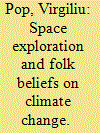

|
|
|
|
|
| Publication |
2011.
|
| Summary/Abstract |
This article surveys a series of folk beliefs of currency at the time of the Apollo missions, that link space exploration with disastrous events occurring at the same time. Floods, droughts, earthquakes and conjunctivitis-all were blamed, by people pertaining to very different cultures, on the actions of reckless astronauts who irked the Divinity or disturbed the celestial mechanics. As will become evident, these folk beliefs fit an existing pattern explainable in the context of "cultural lag" and "future shock." These social phenomena are common to sociology, and when referring to the context of outer space, fall under the purview of astrosociology.
|
|
|
|
|
|
|
|
|
|
|
|
|
|
|
|
|
|
|
|
|